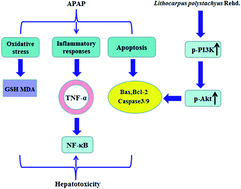Retracted Article: The PI3K/Akt and NF-κB signaling pathways are involved in the protective effects of Lithocarpus polystachyus (sweet tea) on APAP-induced oxidative stress injury in mice
Abstract
Acetaminophen (APAP)-induced acute liver injury (ALI) is a health issue that has gradually attracted attention, and is often regarded as a model of drug-induced hepatotoxicity. The leaves of Lithocarpus polystachyus Rehd. (named as “sweet tea”, ST) usually serve as tea drink and folk medicine for healthcare in the southwest part of China. In previous reports, it has been proven to protect various animal models, except for APAP-induced liver injury model. Therefore, this study initially explored the protective effect of ST leaf extract (STL-E) on hepatotoxicity induced by APAP in ICR mice. STL-E of 50 and 100 mg kg−1 were given to each group for 7 days. ALI was intraperitoneally induced by APAP treatment (i.p. 250 mg per kg body weight). Biochemical markers, levels of inflammatory factors, histopathological staining and western blotting were used to analyze the inflammation and apoptosis of liver tissues. Interestingly, the treatment with STL-E significantly attenuated APAP-induced liver injury (p < 0.05). Moreover, STL-E partially mitigated APAP-induced liver injury by effectively activating the PI3K/Akt pathway and inhibiting the NF-κB pathway. In a word, STL-E protected liver against APAP-induced hepatotoxicity by inhibiting the PI3K/Akt-mediated apoptosis signal pathway and inhibiting the NF-κB-mediated signaling pathway.



 Please wait while we load your content...
Please wait while we load your content...